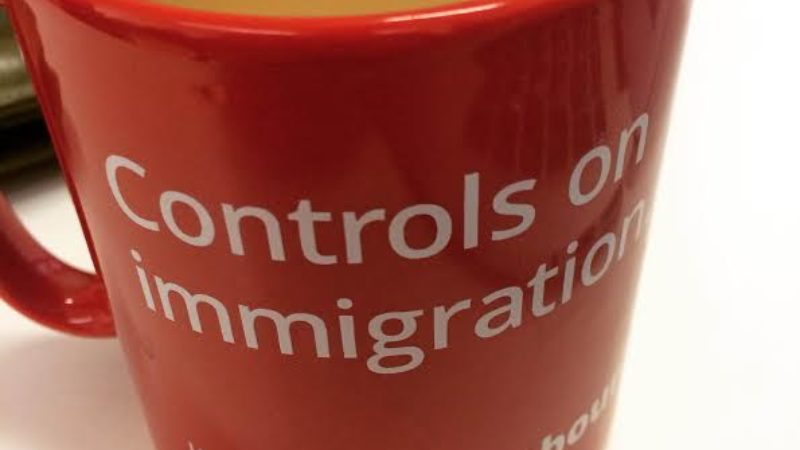
All the noise coming from Labour around immigration over the last few weeks has revealed an essential truth about the way in which our electoral system skews politics to the right.
Stephen Kinnock, shadow minister for immigration, slammed the Conservatives’ record on immigration and told the Commons last week that “we want and expect net immigration to reduce”
He also faced criticism for supporting the Tories’ decision to ban international students from bringing family members over to the UK.
At PMQs, Keir Starmer accused Rishi Sunak of having “lost control of immigration” and talked of “weaning the government off the immigration lever” in favour of better investment in skills at home.
Starmer does have a point about this Conservative government’s lack of investment in the domestic workforce, and is right to commit to providing better training and opportunities to people in the UK.
Tory trap on immigration
But Labour has once again fallen into the Tory trap of unswervingly accepting the premise that immigration is a drain on our country’s resources and that net migration figures must fall at all costs.
This anti-immigration pantomime doesn’t reflect the nuances of the debate the rest of us are having, and only serves to coarsen our public discourse around an issue we should be treating with nuance and respect.
The Labour leadership doesn’t appear to feel any pressure to question the narrative set by the Tories or attempt to chart an alternative path. After all, this migrant-bashing rhetoric is part of the furniture of British politics.
You’d think then, given the unified tone of this debate from both sides of the House, that the majority of the public are dead-set against immigration as a matter of principle. After all, isn’t it the job of politicians to reflect the will of the people?
Voters are split on the merits of immigration
But the data reveals a different picture entirely. Voters are approximately evenly divided on the question of whether immigration has enriched or undermined society, according to the Financial Times.
So why are both of our main parties pitching to the right of the median voter rather than reflecting both sides of the debate? The answer lies, at least in part, in our crooked electoral system, first past the post (FPTP).
In Britain’s skewed electoral geography, wasted Labour votes (which are more likely to be pro-immigration) are piled up in huge super-majorities in urban areas, while Conservative votes (which are more likely to be anti-immigration) are spread much more evenly across the country.
So while there isn’t a clear majority in favour of or against immigration amongst the public as a whole, three-quarters of seats have anti-immigration majorities.
First past the post devalues our votes
This leads us to a sad, but essential truth: under FPTP, the power of your vote (or lack thereof) is dictated by the brute luck of where you live.
FPTP limits the paths to victory for Labour, as it cannot rely on simply winning a majority of votes in the country as a whole – it must win majorities in key constituencies to be sure of an overall majority in the House of Commons.
The twisted rules of our electoral system mean it’s more advantageous for Labour to spread its vote thinly and widely than to focus too much on any geographical area where victory is already assured.
The real voters, the ones who count, are those who live in swing seats, and are assiduously courted by both parties at the expense of the rest of the country.
This leads to the absurd situation where half of the country or more is left out in the cold while Labour and the Tories fight over the handful of voters who can actually change things.
As a result, our public debate around immigration and myriad other key issues simply doesn’t reflect the will of the country.
But there is another way. Instead of pitching to the right to capture wavering Tory voters, Labour could build closer ties with the other progressive parties with which it has so many shared values.
Rather than fighting with the Tories for their votes, it could work to mobilise the progressive majority that already exists in so many constituencies across the country, but is obscured by the straitjacket of our two-party system.
This would allow it to better represent the views of both its party members and the country as a whole.
Local elections show the potential of a progressive alliance
The local election results this May showed what progressives can achieve when they work together – Labour, the Greens and the Liberal Democrats all achieved great successes, mostly at the expense of the Tories, who lost more than 1,000 council seats.
Whether Starmer will embrace building closer ties with his progressive neighbours ahead of the next general election remains to be seen – but regardless of what Labour HQ decides, progressive voters are beginning to show an unprecedented willingness to stand side-by-side with one another against the Tories.
According to the Evening Standard, seven million people could vote tactically at the next general election, most of them to get the Conservatives out.
Labour now has a clear choice: try and take voters from the Tories, or work with other progressives to beat them.




More from LabourList
Scottish Parliament elections 2026: Full list of Labour candidates for Holyrood
‘As metro mayors gain power, Labour must tighten political accountability’
Letters to the Editor – week ending 22 February 2026